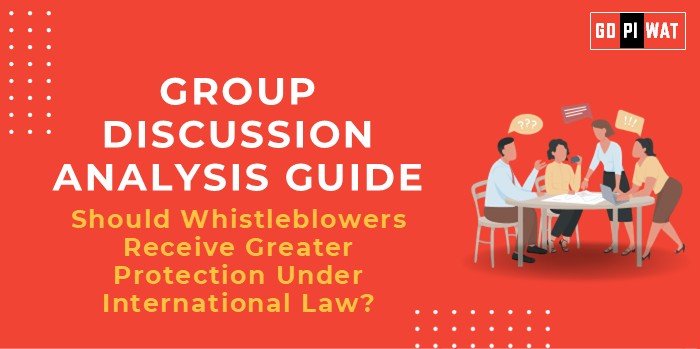📋 Group Discussion Analysis Guide: Should Whistleblowers Receive Greater Protection Under International Law?
🌐 Introduction to the Topic
- 🌍 Opening Context: Whistleblowers often risk their careers, safety, and lives to expose wrongdoing in government, corporations, and organizations. Recent high-profile cases, such as those involving Edward Snowden and Frances Haugen, highlight the global significance of their role in accountability and transparency.
- 📜 Topic Background: Whistleblowing involves disclosing information on illegal, unethical, or dangerous activities. While protections exist in some jurisdictions, such as the U.S.’s Whistleblower Protection Act, global inconsistencies in legal safeguards expose whistleblowers to severe retaliation.
📊 Quick Facts and Key Statistics
- 📈 Transparency International (2023): 85% of whistleblowers worldwide face retaliation, including job loss, defamation, and legal action.
- 🌐 Global Integrity Index (2022): Only 45 out of 195 countries have robust whistleblower protection laws.
- 🔍 UN Data (2023): Over 60% of corruption cases worldwide were uncovered due to whistleblower disclosures.
- 🇪🇺 EU Whistleblower Directive (2019): Mandates member states to establish comprehensive protections by 2021, but implementation remains uneven.
🏛️ Stakeholders and Their Roles
- 🏢 Governments: Enact and enforce whistleblower protection laws.
- 🌍 International Organizations (UN, OECD): Advocate for cross-border frameworks and policies.
- 💼 Private Corporations: Implement internal whistleblowing channels and policies.
- 👥 Civil Society and NGOs: Support whistleblowers legally and emotionally, advocate for their rights.
🏆 Achievements and Challenges
✨ Achievements:
- 💰 U.S. False Claims Act: Recovered $2.2 billion in fraudulent payments (2023).
- 🇪🇺 EU Whistleblower Directive: Covers public and private sector disclosures.
- 📜 Global Scandals Exposed: Whistleblowers have uncovered global scandals like Panama Papers and Facebook Papers.
⚠️ Challenges:
- ⚔️ Retaliation: Legal loopholes and lack of enforcement in many regions.
- 🌍 Jurisdictional Issues: Difficulty in protecting whistleblowers operating across borders.
- 📉 Lack of Awareness: Many employees are unaware of their rights or protection mechanisms.
🌍 Global Comparisons:
- ✅ Success: EU Whistleblower Directive ensures protections across sectors.
- ❌ Challenges: Despite its scope, implementation remains uneven globally.
📖 Case Study: In Brazil, weak accountability mechanisms have fueled populism and governance instability.
💬 Structured Arguments for Discussion
- ✅ Supporting Stance: “Global frameworks for whistleblower protection are necessary to combat corruption and uphold democratic values, as evidenced by the successes of the U.S. False Claims Act and EU Directive.”
- ❌ Opposing Stance: “Excessive protection may encourage malicious disclosures and economic instability, as seen in the misuse of whistleblower channels in some corporate disputes.”
- ⚖️ Balanced Perspective: “While whistleblower protections are crucial, safeguards must balance confidentiality with accountability to prevent misuse.”
💡 Effective Discussion Approaches
- 🎯 Opening Approaches:
- 📊 “According to Transparency International, 85% of whistleblowers face retaliation globally. How can international law bridge this gap?”
- 📖 “The Panama Papers whistleblower uncovered global corruption but faced threats and legal battles. Should such individuals have had greater international legal protections?”
- 🛡️ Counter-Argument Handling:
- 📖 Use specific case studies like Edward Snowden or EU Directive implementation.
- 🌟 Highlight solutions such as third-party reporting channels or anonymous disclosures.
📌 Strategic Analysis of Strengths and Weaknesses
- 🌟 Strengths: Promotes transparency, deters corruption, enhances accountability.
- ⚠️ Weaknesses: Risk of misuse, resource-intensive enforcement, cultural resistance.
- 🌟 Opportunities: Global collaboration, technological solutions for anonymity.
- ⚠️ Threats: Political interference, legal inconsistencies.
📚 Connecting with B-School Applications
- 💼 Real-World Applications: Whistleblower protections align with corporate governance, ethics, and risk management studies.
- 🗨️ Sample Interview Questions:
- 🌍 “How can businesses create safe channels for whistleblowers?”
- 📜 “Evaluate the role of whistleblowers in strengthening democracy and transparency.”
- 📖 Insights for B-School Students:
- 📚 Explore whistleblowing in business ethics projects.
- 🔍 Research its impact on corporate risk and compliance.


